Everyone wants to get better at something, whether it’s maths, what you eat or what you can do with your time.
When you start to study the people who are at the top level, you will notice certain patterns.
There is a cycle that allows for growth and success at basically anything. Firstly, let me clarify what I mean by growth and success.
Growth is when you are better than before. You are at a starting point and then you got better. Better could be very specific and numbers based or it could be something that is more personal and emotional. Growth essentially means that there is an improvement in what you are doing. This is the hint of what is to come, to grow you need to take the right time.
Think of actual physical growth, a baby goes from toddler to small kid to bigger kid to young adult and so on. Growth is going from one stage to another stage.
When you want to grow, there is a goal in mind. Everyone was asked at some point in their life, ‘what do you want to be when you grow up’, this question is honestly quite baffling.
It is baffling because
#1 what happens if you become what you wanted to be, do you now stop growing?
#2 what if you change your mind, does that mean you haven’t grown?
#3 does ‘growing up’ just mean when you get older? Once you are older does that mean you have to now stick with what you are doing and be stagnant?
#4 why is this question mainly asked to little kids? Is it as Paula Poundstone said, “Adults are always asking little kids what they want to be when they grow up because they’re looking for ideas.”
This video of Idris Elba and Purdey doing a campaign on #ThriveOn, hits the hammer on the nail with what I’m saying about growth. We never truly stop growing, unless we choose to.
Success is when you can finally say, ‘yeah I did it, I did that’. It is in one aspect, achieving your goals and dreams but also realising that you don’t have to stop. Success does not have to be what other people have defined for you. It does have to be defined by you, if you can’t imagine what success would look like how will you know that you have achieved success?
Personally speaking, I think of success as milestones, once you reached one milestone you are on to the next. We can see this in people who are at the top of their game, they keep on growing and becoming more successful a great example of this is someone like Elon Musk.
Elon Musk founded Zip2 which eventually got sold and he made $22 million. Let’s just pause there shall we? Zip2 was a company which primarily provided and licensed online city guide software to newspapers. This guy made 8 figures from selling an online city guide software to newspapers! Most people would have just stopped there, let’s face it $22m is more than enough to live off.
He then goes on to make Paypal, which I’m sure you have heard about. Paypal gets bought by eBay for $1.5 billion stock and Elon made $165 million. If you thought $22m was a lot then just try and comprehend $165m, that is 9 figures. Of course, by now you get the idea, this guy keeps on growing things and succeeding in different industries for example, Tesla motors and SpaceX. I’ll let you do you own homework with finding out more about these examples.
What is most fascinating about Elon Musk, is that he is one case study amongst many. However, he is an example of someone who does not stay stagnant and more importantly neither do you. You may not be the next Elon Musk, but honestly the world does not need another Elon Musk, the world just needs you to continue growing and succeeding.
How can you grow and succeed?
Firstly, you are going to need to develop your own mindset, attitudes and beliefs about yourself.
This is the first step in the cycle: attitude.
Your attitude about yourself massively impacts how you do things. This then affects your attitude towards what you are doing.
Bad attitude about yourself → bad attitude towards what you need to do → bad or no improvement → loops back again.
What you definitely don’t want is a negative feedback loop. Take the example of maths, many people have negative self beliefs about maths ‘I’m bad at maths’ mentality. This makes them think that they can’t improve which then becomes a self fulfilled prophecy. Then because of the lack of improvement, it makes them solidify their initial belief.
To change this, have what Carol Dweck refers to as a growth mindset. Abilities can be developed with time and effort. Even if you think you suck at something or you never tried something before, does not mean it has to stay that way.
Your attitudes are your choice and you are responsible for the choices you make.
Once you decide to change your attitude to a positive one, then you can actually fix your approach.
So the positive loop looks like this:
Positive attitude about yourself → positive attitude towards what you need to do → good and regular improvement → loops back again.
I think that if you are stuck in your position, look at how other people went through your journey and what they have to say. There is so much to learn from others.
To emphasise my point look at what Jason Nazar said on an interview with Inside Quest called ‘Power of Forming Your Own Destiny’. “You can do anything in life so long as you are willing to live with the consequences of those decisions” (16mins 56 secs – 19mins 26 secs), most people want to do something but they are afraid of trying really hard and still failing. This is extremely limiting, because it stops the possibility of ‘what if…’.
What if you changed your attitude to a positive one, tried really hard and then with time got the results you wanted?
It might seem extremely daunting or lonely to go out and try really hard against all odds but guess what, “your belief in yourself has to supercede your situation” (18mins 4secs – 18min 8sec). Think about it this way, if you don’t try then you can only blame yourself for the lack of improvement and results.
Going through difficult situations, is one of the reasons why getting the results you wanted tastes that much better. You may have exams in the summer that you know will impact your future, if you let the situation overwhelm you, how will you deliver your best self?
Having the right attitude, is having a strong reason why you are doing something and making sure it is valid. For example, you want to get better at maths. Get on the why train, take a look at bumbling Bob compared to clear Claire.
Bumbling Bob
Why do you want to get better at maths?
So that I can get a ‘good’ grade.
Why do you want to get a ‘good’ grade?
So that I can impress my parents and teachers, get into the course I want to do and because it would look good when I want to get a job.
Why do you want to do that specific course or get that job?
So that I can get some kind of qualification and launch my future career.
Why do you want that career?
Hmm not so sure, everyone else has a 9-5 job so I guess I should too and I just want to make some money.
If you notice, bumbling Bob goes from wanting a good grade without a clear end goal.
Most people never get on the why train, as a result everything that they do is aimless and mediocre at best. What’s most sad, is that most people will then settle with what they are doing because they have already invested so much time and don’t want to take the risk of starting again.
A better example of how the ‘why train’ should look like:
Clear Claire
Why do you want to get better at maths?
Because it is a skill that I can use in many places in life and something that I can keep on improving.
Why do you want to develop the skill and keep on improving?
So that I can use it to help other areas of my life by using the same approach. The way I can improve in maths is the same way I can improve at anything.
Already just after two questions you can see a stark difference in the mindset and approach to the same task.
Bob doesn’t really know what he wants and why he wants it, whilst Claire is very keen on developing herself to get better at maths. She is not just seeking a good grade for the sake of getting a good grade but seeking to improve herself.
I understand that what you want to do might be very difficult to do, maybe even seems impossible. A lot of people would then come up with excuses for why they can’t ever improve. Hiding behind excuses does not achieve anything so what can be done? Find a way to solve the fear you have of trying to improve and succeed.
Kyle Maynard, man with no limbs climbed up Kilimanjaro (5,895m or 19,341 ft)
This guy has no arms and no legs and he climbed a mountain. Seriously, what kind of excuse can you come up with that you can’t do something? If this guy can climb a mountain then you can easily get better at maths. Have the growth mindset and see other people’s growth and success as inspiring and motivating.
Approach
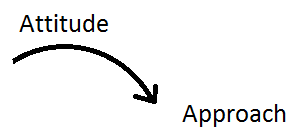
When the right attitude is there, it is critical that the right approach is taken. When it comes to growing and succeeding, approach has a direct link to your ability and attainment.
As I said earlier, attitude is about your internal belief, whereas approach is how you go about acting on that belief.
Having the right approach simply means doing what needs to be done at the right moment and with the right effort. Figuring out what you need to do now and what you can do later. Understanding the necessary steps to complete your task.
Again using maths as an example, let’s say you want to understand circle questions like this:
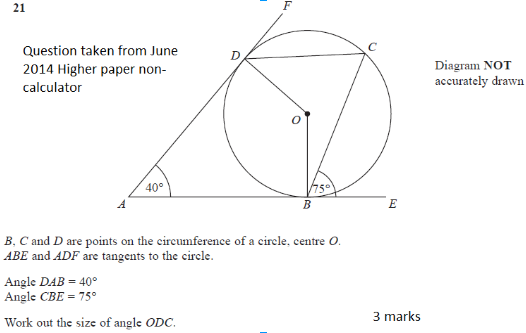 So what do we actually need, to solve the question? All the information is there, you just need to figure it out or as I like to say, use what you know to solve what you don’t know.
So what do we actually need, to solve the question? All the information is there, you just need to figure it out or as I like to say, use what you know to solve what you don’t know.
Because the question is asking for the angle ODC we can focus on the shape OBCD:
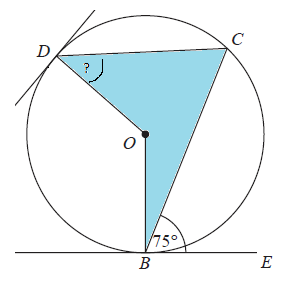
If we can work out the angles around O, B and C inside the blue shape then solving the unknown angle of ODC becomes easier.
First, work out the angle OBC: we know that tangents (line that touches the edge of the circle) are perpendicular to the radius so OBE must equal 90 degrees.
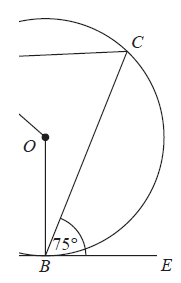
OBC = 90 – 75 = 15 degrees
Next solve the reflex angle BOD:
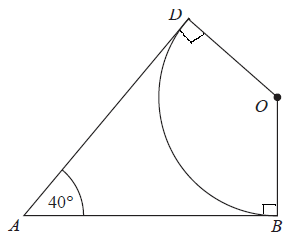 To do that focus on the shape ABOD
To do that focus on the shape ABOD
Because we know about the rule of tangents touching the circle, we know that angles ABO and ADO are 90 degrees (which I drew on to make clearer).
We also know that the angles in a quadrilateral add up to 360 degrees.
So to solve the angle BOD: 360 – 90 – 90 – 40 = 140 degrees
We can work out the reflex angle of BOD because angles around a point equal 360 degrees, so 360 – 140 = 220
Next, solve angle BCD:
We know that the smaller angle of BOD is 140 degrees, using the circle theorem rules we know that this is double the angle of BCD. So angle BCD equals 70 degrees
This is what has been worked out so far:
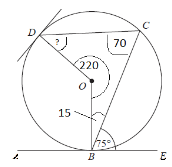 As you can see, it is much easier to solve the unknown angle of ODC.
As you can see, it is much easier to solve the unknown angle of ODC.
Angles in an equilateral adds up to 360 degrees so,
360 – 220 – 70 – 15 = 55 degrees
When a question like this is explained in this way, it seems so simple but pay closer attention to what we just did.
First, we worked out what we needed to focus on. There you have it, one of the biggest enemies to achieving great things, a lack of focus which then results in panic and confusion. Instead of trying to be efficient in everything, the focus was on doing what was needed i.e. being effective over being efficient.
Second, we took a simple step by step approach, one thing leading on to the next. Sometimes you want to get something done, but not having a clear system or guide makes you wander into a chaos of different strategies. Notice how we could have worked out angle OBC after solving angle BOD. However, we could only work out angle BCD after we have worked out angle BOD.
Third, we applied certain rules to solve the question. The thing about gaining the necessary knowledge, is that it’s easy but can be time consuming. Easiest way to learn something, get someone who is more advanced than you to teach you regularly (more on this later). Longer method is to read books and articles to try and self learn. This method is harder because no one is there to correct you or to keep you motivated when you find something challenging.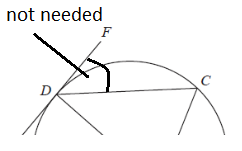
Fourth, we did not waste any time solving angles that would not help us to find out the angle ODC, for example angle CDF. Trying to work out this angle would be utterly useless. Also we did not try and find out the length of anything (like you might do in other circle questions) because the question asked us to find the angle.
Anyone who is at the top of their game, a master of their craft always has someone to help them whether it’s a coach, teacher, mentor or team. If you are trying to get better at something, then why not get someone who is more advanced to help you? Yes it can be hard to find someone who is willing to help you or you might find it hard to even know where to look. The key is to find someone who is better than you at what you trying to accomplish. Prove that you are willing to listen and learn and actually do the work, because people want to help you. If you are a student reading this, improving in maths does not need to be a lonely journey. The teachers at your school want to help you, you can be ultra focused in class and even get after school help. Ask for help from other students, this might be a little awkward socially because you trying to learn and not make friends. At the same time you don’t want to give the wrong impression and overstep any friendship barriers, generally learning from peers can help massively. This goes back to what I said earlier, if you can prove you are willing to learn and have built the trust then of course people would want to help you.
Of course you can get a tutor or join a course to help you improve. If you are a parent then pay close attention to this section. Avoid trying to get a tutor or letting your kid join a course, if you think that would merely get the result you want. Both you and your kid have to invest to improve. That means investing time, money and effort. Effort alone does not get the result but it certainly helps. Showing up everyday and putting the correct amount of time in, even when quitting is easier, is definitely going to help with improving.
Here is a real world example of someone who did not quit, if it was any of us we would have quit a long time ago but she didn’t.
Diana Nyad swam from Cuba to Florida, a record holder for open water swimming of 102.5 miles. Her Ted talk, never, ever give up, highlights how there was an entire team of 30 people who were alongside her when she was swimming. Not only that but she had to keep on pushing on, even if that meant getting stung by jellyfish, swimming in freezing temperatures and unpredictable weather. A remarkable example of someone who was eager to succeed and humble enough to try again and again and learn from others. She literally lived the line ‘just keep swimming, just keep swimming…’(Dory from Finding Nemo).
Getting someone else or a team to help you improve, means that they are measuring your progress and holding you accountable. What to look for in someone (or a team) to help you improve:
- Motivate and push you
- Teach and coach
- Measures what you are doing and gives feedback
The feedback loop looks something like this: you do task → measures what you did → feedback says you did good in… and you need to improve in… → cycle repeats with your new improvements.
To really improve in anything, you have to be willing to consistently learn. The day you stop learning is the day you stop growing, once you stop growing well it can only go downhill from there really. When you realise that you can learn anything you want and actually get better than as LeVar Burton said in an interview with Chase Jarvis from Creative Live for 30 Days of Genius, “Being a learner for life is the antidote to slavery.” (1h 11 mins 43s – 56s). Once you realise that you have choice to learn whatever you want, you no longer have to be stuck with what you have already learnt.
Ability
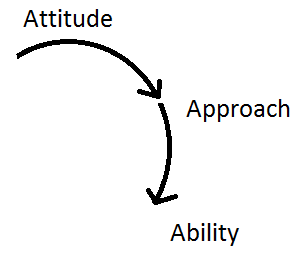 Your ability will naturally improve if your attitude and approach is in place.
Your ability will naturally improve if your attitude and approach is in place.
Remember that this is a cycle, so if something isn’t working then go back to the previous stages.
If you keep on practicing something and your ability has not improved or even gotten worse then take step back and fix the approach and attitude.
Improving your ability, can be measured in many ways but the key here is that it is being measured.
To improve in anything there is a starting point and a growth point.
You have to be honest with yourself and see where you are right now and then take the right steps to actually change and improve. Usually for most people, the hardest part about improving ability is accepting the poor starting point. This can then lead to a fixed mindset as mentioned earlier.
Take a look at someone like Lewis Howes, before he became the founder of The School of Greatness, he was a professional football player and got injured. Listen to his story in this interview with Tom Bilyeu of Quest Nutrition. This guy used to sleep on his sister’s coach, think about that put, yourself in his shoes. You wanted to be something so bad, tragedy happens and it stops you from achieving your dream and you end up living on the couch. What do you do next?
You can see how living like a bum would be the easiest choice but Lewis decided to make a change. He had “the arrogance of belief” that he could not only make the change he wanted but actually live it. Again it started with changing the attitude and approach, he was very intentional and focused. The more focused you are the easier it is to achieve your dream. Notice how Lewis actually got to not doing any public speaking to getting paid $5000 to speak in public. He set himself a certificate of achievement and awarded it to himself signed and dated (dated for the future), that was his way of measuring his ability.
Another way of measuring your ability, is to test yourself whether that means in an exam or in some other controlled environment. Whilst tests can be nerve racking and add a ton of pressure, they help show you your strengths and weaknesses. There is a standard to meet (and hopefully beat) that you can clearly measure yourself against. If you’re doing a maths exam, then obviously the pressure is on, but can you still improve your ability with only one final exam? Yes. You practice doing tests beforehand, mock exams etc. This is pretty obvious, most students already do mock exam practice yet still don’t improve, so what is going on?
Most of the time, it is a lack of preparation, poor time management and just panicking unnecessarily. To solve this, break it down, find the main weak points and practice. Destress the whole situation and change your attitude and approach to taking exams.
Talking about destressing and finding more than one opportunity to practice brings me to talk about AlphaGo.
AlphaGo is Google’s DeepMind computer programme that was made in London (get in there son!). The game of Go is an ancient Chinese board game, played on a 19 x 19 sized board, much more complex than chess. There have been other artificial intelligence (AI) programmes that have solved other games such as Chinook solving checkers but with the game of Go, AI hasn’t been that successful. AlphaGo literally learnt the game by playing over and over again millions of times and self learning along the way, before beating the world’s top Go player Lee Sedol 4-1 in March 2016. An unprecedented victory and huge advancement for AI.
Main lesson from this: more attempts = more feedback.
If a computer can learn such a complicated game as Go by playing a ton of games and learning each time, then why can’t you get better at something like maths?
To learn something new can be and is very empowering, especially if you started from scratch. Once you can realise that your ability is not fixed but instead can be worked on, then anything is possible.
As Jim Kwik said in an interview with Lewis Howes, “If knowledge is power then learning is a superpower.” (I won’t give you the exact time of this quote because this interview is too good to skip parts). You can choose what you learn but you are responsible for the choices you make.
How do you know if your ability has actually improved or not (other than just measuring it)?
You won’t struggle as much as you used to and tasks that were difficult to do have now become routine.
Another emotional indicator is that doing the task will feel more natural and instead of overthinking everything, you are simply just doing.
Attainment
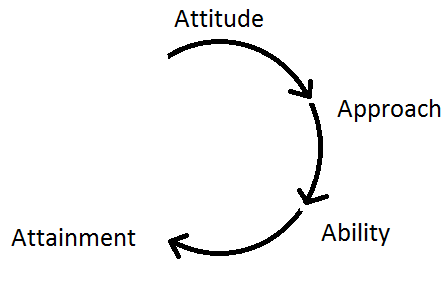 Attainment simply means the results you get.
Attainment simply means the results you get.
Of course everyone wants to be amazing at things, and yes it can be frustrating to totally suck at something. How do you use positive results to your advantage?
Remember how I told you about the benefit of doing loads low risk attempts? Here is why, in his book Power of Habit, Charles Duhigg mentions the significance of the psychology of small wins:
“Small wins fuel transformative changes by leveraging tiny advantages into patterns that convince people that bigger achievements are within reach.”
The idea is that small wins keep you motivated and prove to yourself that you can achieve the big wins as well.
Imagine you are trying to get better at something and you see ZERO improvement, how much longer are going to keep on trying?
Now imagine that you are trying to improve and you see small improvements over time, which one is going to keep you motivated?
Trying to seek a big win on your first attempt is simply not realistic and also extremely stressful. If you took the disciplined approach and built up your small wins then you know that it is only a matter of time till that big win comes in.
Take for example, studying really hard for an exam and you do tons of past papers, make clear notes etc. It’s only going to be a matter of time till you get the grade. There is a lot to say about dealing with exams, too much for this post, however correct your attitude and approach and your abilities in exams is going to improve.
Remember that no one cares about your failures or how long it took you to get the big wins. All people care about are the big wins.
One way to get the massive results you want is using the approach of Noah Kagan of AppSumo. What he does is something called quant based marketing, which is to set one target per year and only do that which helps you to achieve the target. He did this with AppSumo, growing it from 0 to 500,000 customers in only 18 months. He took his focus from Mark Zuckerberg during the early days of facebook, Mark would ask the team whenever they came up with an idea, would it help us grow? If it didn’t he wouldn’t entertain their ideas.
Write down what will help you to achieve your goal, let’s use maths as an example.
To get an A in the final exam.
- Write down what it takes to get an A in the exam, be ultra specific. How many marks is needed, what are the total marks, which questions could you focus on more, which ones do you need to avoid silly mistakes with etc. by doing this, you will make what seems like a monumental task into a series of smaller manageable tasks.
- What will you do from now till the exam to make sure you can get the A. what will you study? With who? When? How? Again be ultra specific.
- Avoid everything that does not help you with your target. See what you can cut down on or even cut out completely in your weekly schedule. Are certain people not benefiting your time? Are you watching/listening/consuming too much media? Find where you spend most of your time and critically analyse if you really need to do that.
- Consistent, meaningful practice. You need to find a way to get work done that will move the needle to your goal.
- When it is time for the exam, it is show time! Execute what you have been practicing and make sure you deliver.
Awesome
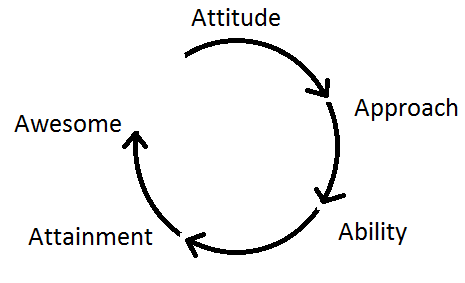 Now that you got the results you were seeking, you have a few options:
Now that you got the results you were seeking, you have a few options:
- Move on to something else to get great at
- Teach others what you learnt
- Keep up on working till you become a grandmaster
You can find zillions of examples of people who fall into each category. These categories don’t have to be exclusive to each other, as there are plenty of people who overlap.
Moving on to something else
There is massive benefit to doing this, as you continuously grow and develop as a person. With certain tasks or skills (whatever you want to call it) there is only so much to master till you start to get bored. Not only that but succeeding in other things can open doors to new opportunities, again look at Elon Musk, the guy wants to colonize Mars (but he definitely didn’t start that way).
Using maths as an example again, getting better at maths can actually help you to get better at other subjects such as engineering, design, programming and so on.
My theory is: If you can get good at one thing, you can be great at anything.
Teaching others
Where would we be as people, if those that came before us did not show us the generosity to teach us their craft.
My advice is if you know someone who needs to improve in something that you are already good at, teach them because you’ll both improve.
You will improve because you are reconsolidating what you know, and you are revising by teaching.
More importantly, the impact is massive, imagine you teach someone something and they then teach it to ten other people and each of those ten people teach it to ten other people and so on. You have brought about massive change by simply teaching something that is good to someone who cares.
Another reason to teach others what you learnt is because it’s fun to see someone else take your journey and see how they grow and change.
Becoming a grandmaster
This can be seen as being selfish but what if what you are doing is impacting a lot of people, is it still selfish? No, we can’t judge intentions but only actions.
Staying a student of your craft is really how grandmasters are made, they never stop learning.
Like I said before, these categories can overlap so what you notice is that most masters are eager to teach their craft and pass the baton on.
Whichever category you choose, know this: those who are awesome at anything especially at the highest level have two key attributes:
- Being humble
- Being hungry
Humble to know their starting point and accept help and to learn from others. Humble to not let failure hurt their ego but instead use it to fuel their success.
Hungry to want it really badly. To keep on trying through tough times and the heaps of doubt. Hungry to keep on improving even when it seems like the best has been achieved. Easy examples of these types of people are in sports.
What will you choose to improve in? What do you want to grow and succeed in? At the end of the day you are responsible for your own growth and success, so it’s up to you to make it happen.
This is a cycle so when you slow down or speed up on one part, it has a knock on effect on the other parts.
Put your name down to get the 9 page booklet
The booklet is meant for you to fill in with great detail. When you fill it out, you will have a foundation to build on and continue in your journey of improvement. I want to help you on this epic journey, so email me back with your answers.
Join me to discover that you can improve in maths. (Hint: improving in maths, means you can improve in other things too)

Put your name down to engage with me and I'll show you how to overcome your barriers in maths.